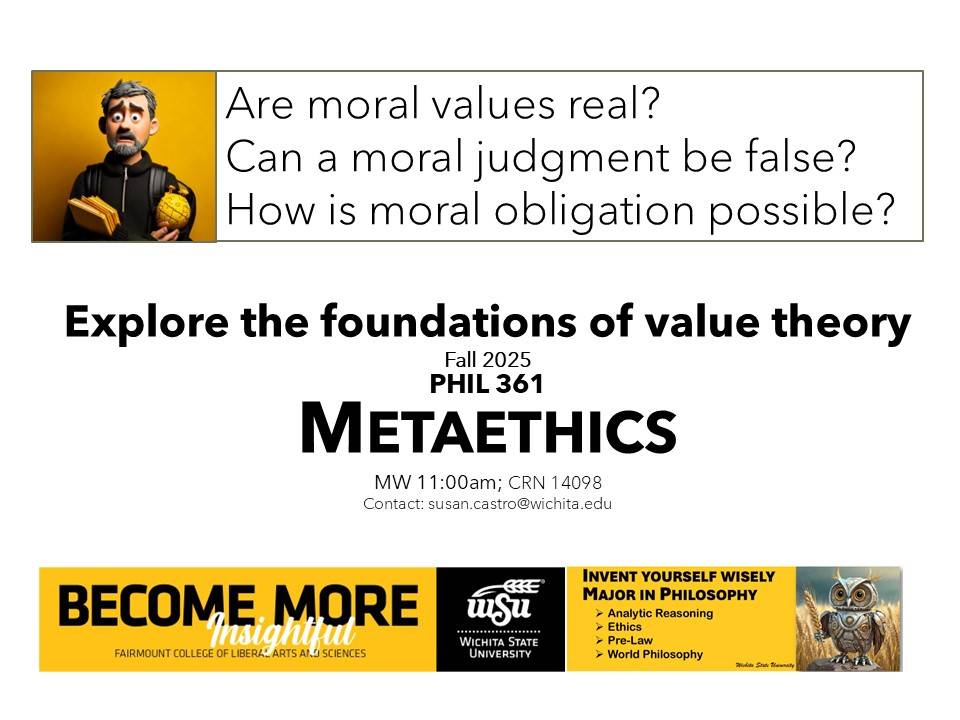Summer Courses 2025
PHIL 105. Critical Reasoning (3).
General education humanities course. Helps students become better at reasoning. Focuses on different patterns of reasoning common in college-level studies and in everyday life. Some patterns are treated in concrete and content-specific ways, and others are treated in highly abstract ways. Students also learn to be critical by different kinds of standards. For example, students learn about how much precision to demand when reasoning about different kinds of topics, and how to evaluate considerations in terms of relevance. Ultimately, students learn how to strengthen their own capacities for reasoning and how to recognize and correct errors in their own thinking and in other people's reasoning. This is a Kansas Systemwide Transfer Course.
- ONLINE Asynchronous. Rebecca Fensholt. CRN 30423
- GEN ED Humanities
- Counts towards Foundation requirement for Analytic Reasoning Concentration
- Counts towards Analytic Reasoning requirement for Pre-Law Concentration
PHIL 125. Introductory Logic (3).
General education humanities course. Introduces students to the use of formal logic as a tool for understanding and evaluating patterns of reasoning. Focuses on deductive validity, logical equivalence and proving soundness. The formal systems introduced in this course are topic-neutral—i.e., they apply to patterns of reasoning on any topic. These formal systems are particularly useful for future studies in areas such as computer science, law, engineering and philosophy.
- ONLINE Asynchronous. Angela Sager. CRN: 30424
- GEN ED Humanities
- Counts towards Foundation requirement for Analytic Reasoning Concentration
- Counts towards Analytic Reasoning requirement for Pre-Law Concentration
PHIL 306 Business Ethics (3).
General education humanities course. A critical examination of representative moral issues that arise in the context of business. Focuses on topics such as the nature of professionalism, the social responsibility of business, regulation, employee rights and obligations, sexual harassment, economic justice, environmental impact, the limits of property rights, and conflicting international mores and practices. Course includes diversity content. Prerequisite(s): PHIL 105 with a grade of C or better.
- ONLINE Asynchronous. Anastasia Pine. CRN: 30425
- Counts towards Applied Ethics for Ethics Concentration
PHIL 327. Bioethics (3).
General education humanities course. Examines ethical issues related to health care such as truth-telling to patients, confidentiality, euthanasia, abortion, prenatal obligations and distribution of health care. Course includes diversity content.
- ONLINE Asynchronous. Jeremy Gallegos. CRN: 30426
- GEN ED Humanities
- Diversity Content
- Counts towards Applied Ethics for Ethics Concentration
PHIL 385. Engineering Ethics (3).
General education humanities course. Examines representative ethical issues that arise in engineering. Topics include: professional responsibility and integrity, whistle-blowing, conflict of interest, ethical issues in engineering consulting and research, engineering and environmental issues, and engineering in a global context. Course includes diversity content. Prerequisite(s): junior or senior standing.
- ONLINE Asynchronous. Scott Hill. CRN: 30427
- ONLINE Asynchronous. Scott Hill. CRN: 30428
- Counts towards Applied Ethics for Ethics Concentration
Fall 2025 Special Offerings
LASI103. StepUp to Higher Education (1). 
This course is designed to promote reflection and support transition to college for students who belong to cohorts that may face particular challenges in stepping up to higher education. For example, such cohorts may include students who are first generation immigrants, veterans, Native, formerly incarcerated, or who have a disability. By developing their institutional knowledge about higher education in general and WSU in particular, by reflectively examining their life course and particular challenges in the context of the liberal arts and sciences disciplines, and by working with faculty and staff to facilitate the transition into college, students will prepare for entry into a degree program at WSU. This course is not a substitute for the First Year Seminar. This semester our focus is prospective students who have a criminal record.
Market-Based Tuition: $30
Tuesday evenings 5:30-7:30pm
August 19 - October 7, 2025
WSU Old Town Campus, 213 N Mead
Instructors: Susan Castro (Philosophy), Brendan Clark (Psychology), Catherine Searle (Mathematics)
Enroll at https://slate.wichita.edu/register/LASI103
Introductory Courses Fall 2025
PHIL 100. Introduction to Philosophy (3).
General education humanities course. Provides an introduction to philosophy and an opportunity for students to dive into the deepest questions of life. What is the purpose of life? Can two people disagree and both be correct? Is beauty only in the eye of the beholder? What is science, anyway? Are people obligated to obey the law? What makes someone the same person over time? Students explore a variety of philosophical questions to develop their communication and argumentation skills through discussion, analytic reading, academic writing and other assignments. This is a Kansas Systemwide Transfer Course.
- IN PERSON. MWF 9:30am-10:20am. Xiufen Lu. CRN 14083 West Campus
- IN PERSON. Mon/Wed, 12:30pm-1:45pm. Xiufen Lu. CRN 14084
- IN PERSON. Tues/Thurs, 11:00am-12:15pm. Instructor TBD. CRN 14085
- Requirement for World Philosophy Concentration
PHIL 105. Critical Reasoning (3).
General education humanities course. Helps students become better at reasoning. Focuses on different patterns of reasoning common in college-level studies and in everyday life. Some patterns are treated in concrete and content-specific ways, and others are treated in highly abstract ways. Students also learn to be critical by different kinds of standards. For example, students learn about how much precision to demand when reasoning about different kinds of topics, and how to evaluate considerations in terms of relevance. Ultimately, students learn how to strengthen their own capacities for reasoning and how to recognize and correct errors in their own thinking and in other people's reasoning. This is a Kansas Systemwide Transfer Course.
- ONLINE Asynchronous. Rebecca Fensholt. CRN 14105
- IN PERSON. Mon/Wed, 12:30pm-1:45pm. Patrick Bondy. CRN 14086
- GEN ED Humanities
- Counts towards Foundation requirement for Analytic Reasoning Concentration
- Counts towards Analytic Reasoning requirement for Pre-Law Concentration
PHIL 125. Introductory Logic (3).
General education humanities course. Introduces students to the use of formal logic as a tool for understanding and evaluating patterns of reasoning. Focuses on deductive validity, logical equivalence and proving soundness. The formal systems introduced in this course are topic-neutral—i.e., they apply to patterns of reasoning on any topic. These formal systems are particularly useful for future studies in areas such as computer science, law, engineering and philosophy.
- IN PERSON. Tues/Thurs, 9:30am-10:45am. Instructor TBD. CRN: 14088
- IN PERSON. Mon/Wed, 11:00am-12:15pm. Instructor TBD. CRN: 14087
- IN PERSON. Mon/Wed, 12:30pm-1:45pm. Instructor TBD. CRN: 14089
- GEN ED Humanities
- Counts towards Foundation requirement for Analytic Reasoning Concentration
- Counts towards Analytic Reasoning requirement for Pre-Law Concentration
PHIL 228 Introduction to Japanese Philosophy (3).
Cross-listed as JAPN 228. A survey of Japanese philosophy that selects topics and relevant figures from the ancient period (roughly the late sixth century CE) to the present day. Examines the emergence of Japanese philosophical contributions from philosophical movements like Buddhism (especially Zen and Pure Land Buddhism), Confucianism, and Shintoism prior to the Meiji Restoration in 1868 and the appropriation and critique of Western philosophy in the post-Meiji era. Topics may include the nature of reality, aesthetics, the “bodymind,” ethics, impermanence and the significance of death, the insubstantial self, questions about meaning, environmental philosophy, and philosophy of technology.
- GEN ED Humanities
- Counts towards World Philosophy Concentration, Asian Studies Certificate
- Diversity content
Upper Division Courses Fall 2025
PHIL 304 Latin American and LatinX Thought (3)
Cross-listed as MCLL 304. Examines the origins of Latin America, how social-political forces have shaped Latin American identity, and the borders that separate Anglo America and Latin America. Engages historically influential Latin American philosophers as well as contemporary Latinx philosophers. Attributes: GEN ED Humanities, Diversity content, counts towards World Philosophy Concentration.
- IN PERSON Tues/Thurs, 11:00am-12:15pm. Jose Navarro-Serrano. CRN: 14618
- Counts towards World Philosophy Concentration
PHIL 306 Business Ethics (3).
General education humanities course. A critical examination of representative moral issues that arise in the context of business. Focuses on topics such as the nature of professionalism, the social responsibility of business, regulation, employee rights and obligations, sexual harassment, economic justice, environmental impact, the limits of property rights, and conflicting international mores and practices. Course includes diversity content. Prerequisite(s): PHIL 105 with a grade of C or better.
- ONLINE Asynchronous. Anastasia Pine. CRN: 14106
- Counts towards Applied Ethics for Ethics Concentration
PHIL 310 Classical Philosophy of Law (3).
What is law? Is it a system of commands, rules or norms? How are these different? Need law be a system at all? Can it be law if it doesn’t meet a minimum standard of ethical decency? Is law autonomous, or is it reducible to something else? In this course, students study the progression of philosophical arguments and issues concerning the nature, objectivity, normativity, authority, function and implementation of law through classical texts by founders of the discipline like Austin, Hart, Fuller, Finnis, Kelsen and Raz. This course partially replaces PHIL 311. Department permission is required for students who have taken PHIL 311 to enroll in PHIL 310.
IN PERSON. Tues/Thurs, 11:00am-12:15pm. Patrick Bondy. CRN: 14091
- GEN ED Humanities
- Counts towards Pre-Law Concentration
PHIL 327. Bioethics (3).
General education humanities course. Examines ethical issues related to health care such as truth-telling to patients, confidentiality, euthanasia, abortion, prenatal obligations and distribution of health care. Course includes diversity content.
- ONLINE Asynchronous. Jeremy Gallegos. CRN: 14107
- IN PERSON. Tues/Thurs, 11:00am-12:15pm. Angela Sager. CRN: 14092
- IN PERSON. Mon/Wed, 11:00am-12:15pm. Angela Sager. CRN: 14093
- IN PERSON. Tues/Thurs, 2:00pm-3:15pm. Christopher Fox. CRN: 14094
- GEN ED Humanities
- Diversity Content
- Counts towards Applied Ethics for Ethics Concentration
PHIL 346. Philosophy of Religion (3).
Examines some basic religious problems such as the nature and grounds of religious belief, religious language, the existence and nature of God, human immortality, and the problem of evil.
- IN PERSON. Monday/Wednesday, 9:30-10:45am. Patrick Bondy. CRN: 26349
- GEN ED Humanities
- Counts towards World Philosophy Concentration with department permission
PHIL 354. Ethics and Computers (3).
General education humanities course. Ethics with application to the ethical issues which may arise from the use of computers, including the moral responsibility of computer professionals for the effect their work has on persons and society; the moral obligations of a computer professional to clients, employer and society; the conceptual and ethical issues surrounding the control and ownership of software; and the justifiability of regulation of the design, use and marketing of computer technology. Course includes diversity content. Prerequisite(s): junior standing or departmental consent..
- IN PERSON. Tues/Thurs. 12:30-1:45pm. Scott Hill. CRN: 14097
- IN PERSON. Tues/Thurs. 9:30-10:45am. Susan Castro. CRN: 14096. Open Alt Textbook - Zero Cost
- Counts towards Ethics Concentration
PHIL 361. Metaethics (3).
Studies selected topics in metaethics. Investigates, for example, ethical realism, moral relativism, expressivism, moral knowledge, moral motivation and moral value. Readings may include work from figures such as G.E. Moore, A.J. Ayer, R.M. Hare, J.L. Mackie, Gilbert Harman, Philippa Foot, Bernard Williams and Christine Korsgaard. Prerequisite(s): PHIL 100, 125, or 144.
Are moral values real? Can a moral judgment be false? How is moral obligation possible? Explore the foundations of value through arguments for and against moral realism, objectivism, cognitivism, and more.
- IN PERSON. Mon/Wed. 11:00am-12:15pm. Susan Castro. CRN: 14098
- Counts towards Ethics Concentration
PHIL 385. Engineering Ethics (3).
General education humanities course. Examines representative ethical issues that arise in engineering. Topics include: professional responsibility and integrity, whistle-blowing, conflict of interest, ethical issues in engineering consulting and research, engineering and environmental issues, and engineering in a global context. Course includes diversity content. Prerequisite(s): junior or senior standing.
- ONLINE Asynchronous. Jason Matteson. CRN: 14108
- IN PERSON. Mon/Wed, 2:00-3:15pm. Scott Hill. CRN: 14102
- IN PERSON. Tues/Thurs, 9:30-10:45am. Scott Hill. CRN: 14100
- IN PERSON. Tues/Thurs, 11:00am-12:15pm. Scott Hill. CRN: 14101
- Counts towards Applied Ethics for Ethics Concentration
PHIL 386. Biomedical Engineering Ethics (3).
Biomedical engineering is changing extremely rapidly, with the incorporation of new technologies from material science, computer software, nano engineering and robotics, among others. Each of these emerging areas presents new questions in ethics, raising new questions concerning human subjects protections, autonomy, acceptable risks and more. The regulatory framework for evaluation and approval of these technologies is largely grounded in our current understanding of these ethical issues, thus it too is evolving. This course examines these areas and the questions they pose, and develops an ethical framework for evaluation of these issues. Cases illustrating the ethical issues are integrated into the course material.
This semester's topics and application areas will include the BMES Code of Ethics, classical bioethics, benchside research integrity, IRBs and clinical trials, HIPAA and data integrity, IACUC & animal subjects, tissue engineering, implants and wearables, drug delivery, biomolecular machines, (epi)genetic engineering, transhumanism and posthumanism, and topics chosen by enrolled students.
- IN PERSON. Tues/Thurs, 12:30-1:45pm. Susan Castro. CRN: 14103
- OAR: All course materials are free to enrolled students
- Counts towards Ethics Concentration
- Diversity Content
PHIL 590AD. Environmental Ethics (3).
Surveys various philosophical and ethical questions raised by human interaction with, and impact on, the natural environment. Focuses on historical and contemporary, theoretical and applied, issues in environmental ethics. Topics include: anthropocentrism versus nonanthropocentrism; environmental justice and rights; progress and innovation versus stewardship and restoration; the science of climate change.
This semester, we first look at views of the environment that emphasize human dependence upon, and impacts on, nature, then consider alternative holistic views such as the Gaia hypothesis, views of kinship with other-than-human beings found in Indigenous philosophies, and views of ecosystems as communities (e.g., in Aldo Leopold's writings). We will consider the consequences that mutualisms (mutually beneficial relationships between species) and ecosystem "engineers" (e.g., the Beaver) have for various views of the natural environment.
We will examine the ethics of framing issues about the changing climate as a crisis, critique proposed "solutions" to it, and listen to accounts by those displaced and/or affected not only by changes in the climate, but by some of these programs.
We will then examine the factors that led to, and the ethical and social justice issues that arise from, pollution and unsustainable practices. Finally, we examine societies that have successfully developed sustainable industries, and the principles they subscribe to.
This course is suitable for upper level undergraduates, with academic demands on a par with a 300 level philosophy course.
- IN PERSON. Tues/Thurs, 2:00-3:15pm. Susan Sterrett. CRN: 14104
Next steps



